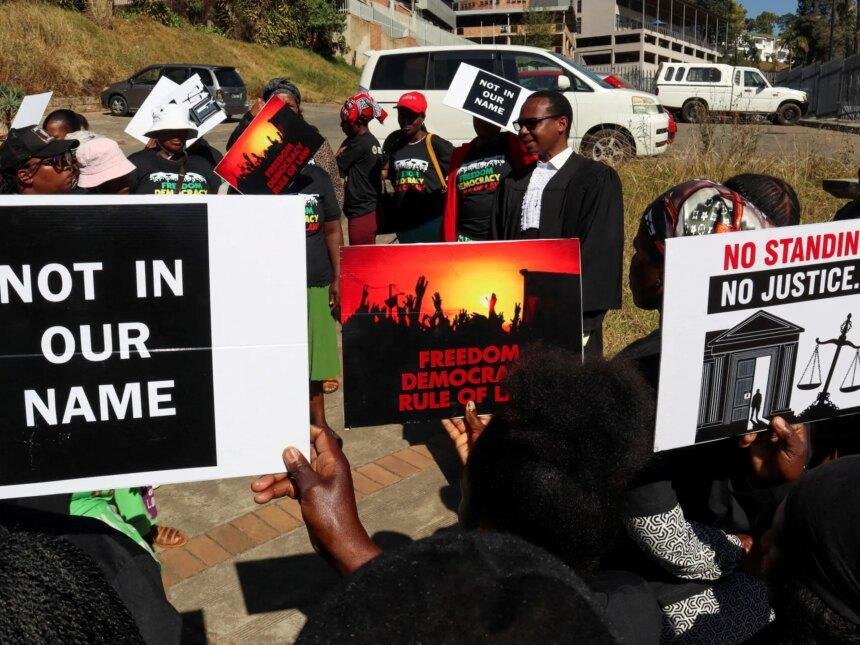U.S. Continues Controversial Deportation Flights to Eswatini Amid Human Rights Concerns
The United States has recently intensified its controversial deportation strategy by sending a second flight of individuals to Eswatini, a small nation in southern Africa. This move has raised significant human rights concerns, particularly regarding the treatment of deportees who have no ties to the country they are being sent to.
A New Wave of Deportations
On Monday, the government of Eswatini confirmed the arrival of ten deportees from the U.S., following a previous flight in July that transported five individuals. The White House has stated that these deportees were convicted of serious crimes, although neither the U.S. nor Eswatini has disclosed the nationalities of those involved. However, immigration attorney Tin Thanh Nguyen has indicated that among the latest group were individuals from Vietnam, the Philippines, and Cambodia.
This practice of sending deportees to countries where they have no connections is part of a broader strategy employed by the Trump administration, which has increasingly relied on “third-country” deportations as a means to circumvent legal barriers that prevent the return of individuals to their home nations.
Human Rights Implications
Human rights advocates have expressed alarm over the treatment of deportees in Eswatini. Reports indicate that the first group of deportees faced harsh conditions, including solitary confinement and a lack of access to legal representation. Nguyen, who represents some of the deportees, has stated that he has been unable to communicate with his clients due to restrictions imposed by the Eswatini government.
“I cannot call them. I cannot email them. I cannot communicate through local counsel because the Eswatini government blocks all attorney access,” Nguyen remarked, highlighting the challenges faced by those seeking to advocate for the rights of deportees.
The Broader Context of Deportation Policies
The U.S. government’s reliance on third-country deportations is not a new phenomenon. Historically, similar practices have been observed in various administrations, but the current approach has drawn particular scrutiny. Critics argue that this method can leave individuals stranded in countries where they may not speak the language or have any support networks, effectively denying them due process.
In addition to Eswatini, the Trump administration has also deported individuals to countries such as South Sudan, Ghana, and Rwanda. Each of these nations presents its own set of challenges for deportees, further complicating their situations.
Government Responses and Legal Challenges
The White House has defended its actions, with spokesperson Abigail Jackson asserting that the deportees sent to Eswatini had committed “heinous crimes,” including murder and rape. “They do not belong in the United States,” Jackson stated, framing the deportations as a necessary measure for public safety.
However, activists within Eswatini have condemned the secretive nature of the agreement between the U.S. and their government. They have initiated legal challenges aimed at halting the deportation flights, arguing that the arrangement undermines both human rights and the rule of law.
The Eswatini Department of Correctional Services has responded to these concerns by asserting its commitment to the humane treatment of all individuals in custody. The department has indicated that deportees will be held in correctional facilities until they can be repatriated to their home countries, although the timeline for such repatriation remains uncertain.
Historical Precedents and Comparisons
The current situation in Eswatini can be compared to past instances of U.S. deportation policies that have faced backlash. For example, during the 1990s, the U.S. government implemented a series of policies that led to the mass deportation of individuals to countries in Central America, often resulting in similar human rights concerns. The long-term effects of these policies have been felt in both the U.S. and the countries to which individuals were deported, leading to increased violence and instability.
Conclusion
As the U.S. continues its controversial deportation flights to Eswatini, the implications for human rights and international relations remain significant. The treatment of deportees, the legal challenges posed by activists, and the broader context of U.S. immigration policy all contribute to a complex and evolving situation. As this story unfolds, it will be crucial to monitor the responses from both the U.S. government and the Eswatini authorities, as well as the impact on the lives of those affected by these deportations.











